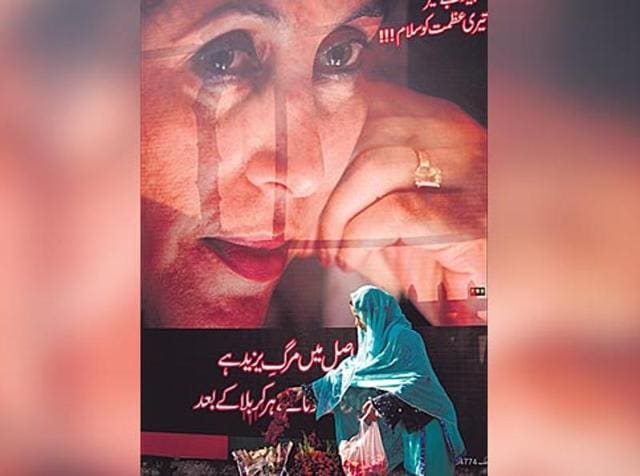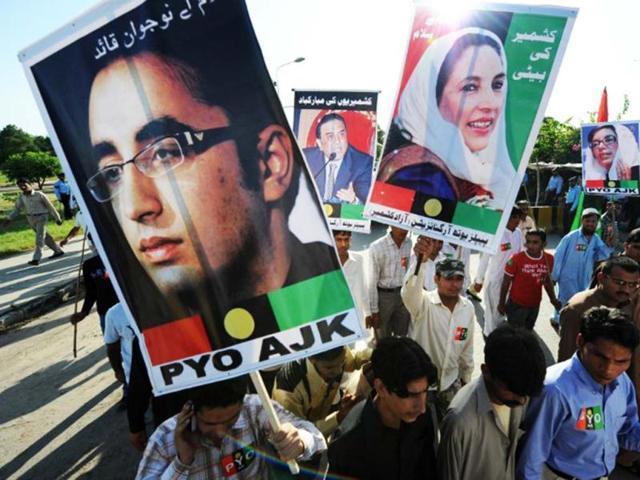Pakistan People’s Party now a shadow of its glorious past
Once the most popular political party in the country, the Pakistan People’s Party is nowhere near the power it wielded in the 1970s, when it swept the polls twice under the dynamic leadership of its founder Zulfikar Ali Bhutto.
Once the most popular political party in the country, the Pakistan People’s Party is nowhere near the power it wielded in the 1970s, when it swept the polls twice under the dynamic leadership of its founder Zulfikar Ali Bhutto.

In the 1980s and 1990s, the PPP played a leading role in the movement to restore democracy and swept the polls again under Bhutto’s daughter Benazir.
Though it came to power again in the 2008 polls on the strength of a sympathy wave generated by the assassination of Benazir Bhutto, the PPP has been relegated to a provincial party, its members disheartened and its leadership in disarray.
One of the reasons for this is that after the death of Benazir Bhutto in 2007, the party’s reins were handed over to her husband, Asif Zardari. In a will that is contested by many, Benazir is believed to have instructed Zardari to take charge till her son, Bilawal, came of age.

But in less than 10 years, the PPP’s complexion has been changed by Zardari, who has been reluctant to hand over power to Bilawal despite the fact that he is now 27.
“Zardari has raped the PPP,” says Naheed Khan, one of Benazir’s closest aides and her political secretary. “I am sorry but there is no other way to describe it.”
Khan, who was with Benazir when she was assassinated after an election rally in Rawalpindi, and her husband, Safdar Abbasi, were among the leaders removed from the PPP’s powerful central executive committee (CEC) after Zardari took charge.
Today, the CEC is stuffed with those faithful to Zardari, including his two sisters and some business associates, although some of the old guard remains.
However, the infighting within the CEC and the manner in which the party has governed under Zardari has broken the PPP. It made a poor showing in the 2013 general election and is now in power only in the southern Sindh province, for long its traditional bastion. At the centre, the PPP had won 119 seats in 1998, but by 2013, the number plunged to 45.
“The party’s strength was that it won seats in all provinces of Pakistan. Between 1997 and 2013, this distinction was ended as the party came to be seen as ineffective and corrupt,” says journalist Tahir Najmi.
During his stint as president, Zardari’s biggest achievement was managing to complete his term and to oversee a peaceful general election in 2013 that led to a handover of power to another elected administration – another first in Pakistan’s troubled tryst with democracy.
“But this came at a price,” says Najmi. Zardari’s tenure as president, which ran almost parallel with the PPP’s rule at the centre, was mired by politics of compromise and accusations of widespread corruption.
“Deals were cut with other parties for the PPP to stay in power and to keep the army at bay. At the same time, Zardari’s businesses were expanded at the cost of the party,” says Najmi.
It was these rumblings against Zardari which led to one of his closest allies, Zulfiqar Mirza, to revolt. Mirza, a home minister in Sindh, accused the PPP chairman of corruption and nepotism in 2011. With Mirza went other party faithful.
But the PPP’s losses did not result in gains for any other party. Despite 10 years of poor governance in Sindh, the PPP remains the favourite. Mirza and others flirted briefly with Imran Khan’s Tehreek-e-Insaf party but did not shift loyalties.
At the national level, the PPP has suffered considerably and it now remains to be seen whether it can regain its strength. Zardari left Pakistan because of fears he would be arrested and now runs the PPP by remote control.
The only silver lining is that Bilawal Bhutto is now on the ground in Pakistan. Since it was founded, the PPP’s fortunes were tied to those of the Bhutto family. Zardari was the first non-Bhutto to lead the party.
With Bilawal has come a breath of fresh air. In the past he tried to sack Zardari’s corrupt cronies but could not succeed as his father blocked such moves. Observers say Bilawal is treading carefully but is slowly gaining control of the party.



